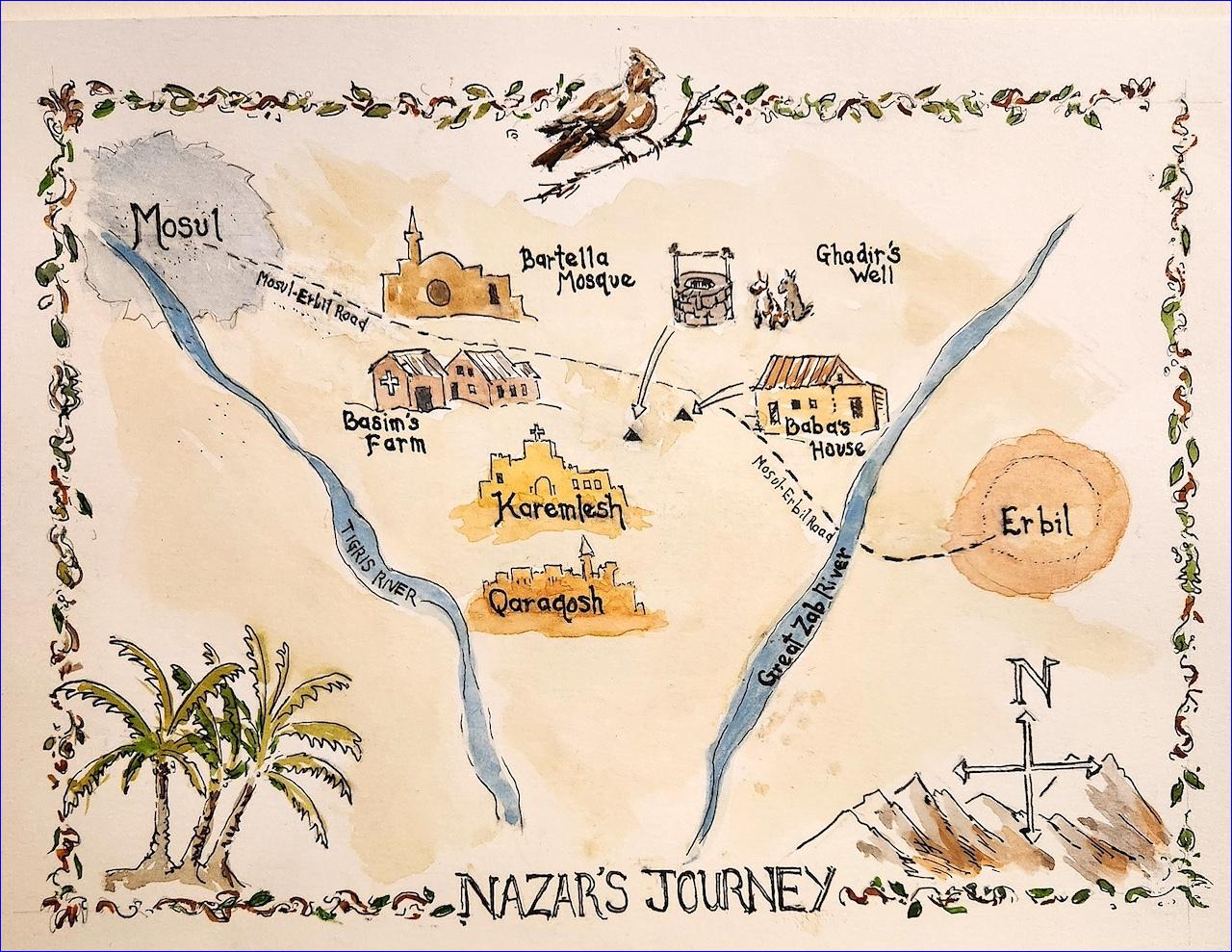


 Paul Mascia)
Paul Mascia)
This crude graffiti is an important detail in "Nazar's Journey," a new book by author Paul Mascia. It takes place during the2014 onslaught of massacres and chaos sparked by ISIS in eastern Syria and northern Iraq.
Mascia, who is from Columbus, Ohio, said proceeds from the book will benefit Brooklyn-based Aid to the Church in Need-United States (ACN-US), which fights for religious freedom across the world, including Iraq.
Related: Timeline of ISIS in Iraq
Related: Attacks on Assyrians in Syria By ISIS and Other Muslim Groups
The story's main character is Nazar, 14, who flees the carnage, hoping to reach safety and find his father in the city of Erbil, but encounters countless dangers along the way.
"Creating those details, I realize, is disturbing," Mascia told The Tablet, the newspaper for the Diocese of Brooklyn, N.Y. "But ... I'm hoping the overall tone of the book is still positive -- that yes, there's suffering in life, but God is still with us." He noted that Christian author C.S. Lewis (1898-1963) wrote popular stories with the understanding that "it is OK to include bad things in a child's tale if you provide a resolution to the evil at the end."
"Nazar's Journey" is a 141- page novella that follows Nazar as he juggles playing soccer with friends and doing chores on his family's farm near the town of Karamlesh, Iraq. But his world shatters as militants pour onto the Nineveh Plains. In one scene, he sees loved ones disappear in a blast fired by a tank stolen by ISIS.
Nazar staggers through the destruction and arrives at the home of a woman, Amira, who years earlier helped prepare him for his first holy Communion. Her front door has been splashed with a crude "N" in black paint.
Nazar and Amira try to outrun the invaders on a highway clogged with refugees fleeing Mosul, hoping to reach safety in Erbil, while they carry Amira's injured father on a makeshift stretcher. Amid the destruction, Nazar discovers hope and purpose while helping others and relying on his faith.
Mascia's inspiration for the book can be traced back to early in his retirement, when he began to read the writings of Pope Benedict XVI. In particular, he appreciated Pope Benedict XVI's observation that people are usually converted by two factors --witnessing the fruitful lives of the faithful and beholding beauty found in artistic expressions.
With that perspective in mind, Mascia resolved he could create evangelistic beauty by revisiting a story he wrote in 1975. A Yale University professor of a child development course gave Mascia's class the option of writing routine class papers or children's stories. Mascia subsequently created a narrative about an injured boy searching for his father during the Vietnam War.
"Nazar's Journey" is an adaptation of that story, but with a different setting.
To research, Mascia called Joop Koopman, director of communications for ACN-US, who consulted but also referred the writer to people who endured the ISIS years. According to Edward Clancy, ACN-US's director of outreach, the collaborations hit the mark.
Clancy said "Nazar's Journey" captures "a lot of what we heard from people who've experienced the forced abandonment."
Another admirer of "Nazar's Journey" is Bishop Robert Brennan, who added it to his summer reading list. He said he got to know Mascia while serving as bishop of Columbus, although he did not work directly with him. Still, Bishop Brennan praised the collaboration between Mascia and ACN-US.
"I stand in admiration of their work," he said of ACN-US. "Also, I think Paul's book does two things."
First, Bishop Brennan said, it accurately portrays people whose inner strengths are fueled by faith despite horrific circumstances.
That's a good tonic for people who become hardened to the reality of war and conclude it's something "beyond my capability of solving," Bishop Brennan said.
"Here, we see a young fellow who is a son, a brother, and a neighbor, and a woman who is a daughter," Bishop Brennan said. "They put the needs of other people first and find a lot of meaning in doing so."
And, second, Bishop Brennan said, "Nazar's Journey" draws attention to ACN-US, giving readers insight and motivation on how to support an organization that helps persecuted Christians.
"We're less powerless than we think," Bishop Brennan said.

or register to post a comment.